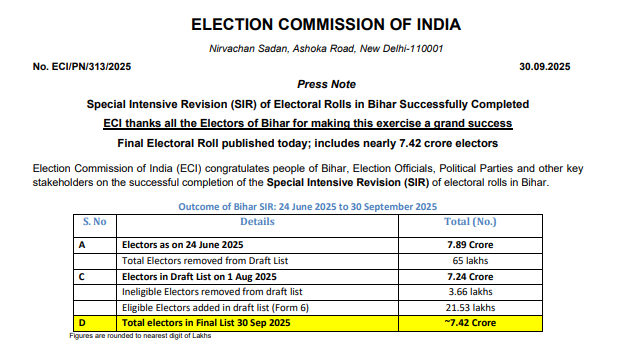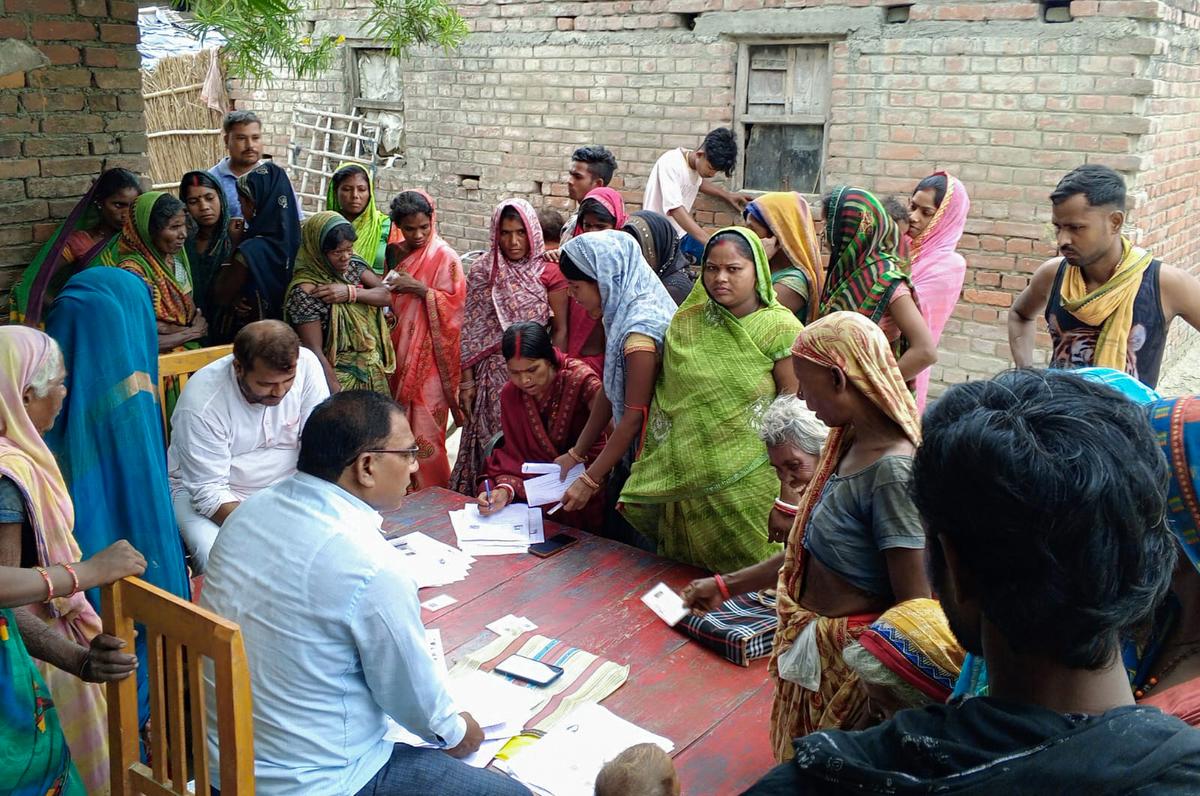After three months of controversy in Bihar’s Special Intensive Revision, on September 30, the Election Commission of India (ECI) has published the final electoral rolls for Bihar. The Special Intensive Revision (SIR), initiated on June 24, has brought the state’s total registered voters down from 7.89 crore to just under 7.42 crore—a net drop of around 47 lakh names, or nearly 6 percent.
The scale and nature of the deletions, and the process itself, have left behind a trail of unanswered questions and unresolved concerns.
Special Intensive Revision of Electoral Rolls in #Bihar Successfully Completed#ECI thanks all the Electors of Bihar for making this exercise a Grand Success
Final Electoral Roll published today; includes nearly 7.42 crore electors
Read in detail: https://t.co/DQEaXv9njk pic.twitter.com/trQtBGKkVl
— Election Commission of India (@ECISVEEP) September 30, 2025
June 24 order set off political uproar over citizenship checks and allegations of targeted deletions
The decision to undertake a state-wide SIR—Bihar’s first in 22 years—was made public on June 24 and implemented the very next day. Unlike routine summary revisions, this was a house-to-house (H2H) enumeration requiring fresh verification of each of the nearly 8 crore electors in the state. Most notably, voters registered after 2003 were required to furnish documents proving their eligibility, including proof of Indian citizenship—a demand that quickly drew political fire.
What made the process more controversial was the nature of documentation sought. Electors were asked to provide either their own or their parents’ place and date of birth, in line with the Citizenship Act, 1955. Initially, only 11 forms of documentary proof were accepted, notably excluding commonly held IDs like Aadhaar or existing Voter ID cards. Opposition parties alleged that this marked a break from precedent and could function as a de facto citizenship test aimed at voter suppression.
Supreme Court steps in, Aadhaar added as 12th document
A series of petitions challenging the SIR’s legal validity soon reached the Supreme Court, with petitioners arguing that the ECI was exceeding its constitutional mandate and risking large-scale disenfranchisement. The ECI defended the move, citing Article 326, which limits voting rights to Indian citizens aged 18 and above.
While the Court did not stay the process, it issued an interim order directing the ECI to include Aadhaar as a “12th document” to establish identity, though it maintained that Aadhaar could not be used as proof of citizenship. This intervention marginally softened the documentation requirement but did not reverse the structural burdens placed on millions of voters.
Draft roll reveals massive deletion: 65 lakh names dropped in draft roll
On August 1, the draft roll revealed the first concrete outcome of the SIR, the voter list had shrunk to 7.24 crore names—a deletion of 65 lakh names, or 8.2% of the total electorate, compared to the June baseline. The scale of the cuts triggered immediate outcry.
According to data shared by the Chief Electoral Officer’s office, these deletions broke down into three broad categories, 22 lakh names were struck off due to death, 36 lakh for permanent migration or absence from the registered address, and 7 lakh due to duplication (electors already enrolled elsewhere).
Ahead of the draft’s publication, ECI officials shared booth-wise deletion lists with political parties to allow for verification, though parties continued to express scepticism about the accuracy and fairness of the process.
Final tally: 21.53 lakh names added, but net loss remains high
The period following the draft roll saw a window (From August 1 to September 30) for citizens & political parties to file claims & objections, and applications for new voter addition.
In this final phase, 21.53 lakh voters were added through Form 6 applications, while 3.66 lakh more names were deleted. This brought the final tally to approximately 7.42 crore voters, a net reduction of 47 lakh names since June 24. Among the final deletions, over 2 lakh were due to migration, 60,000 to death, and around 80,000 were duplicates.

Citizenship verification push yields almost no “Foreign” voter removals
As per ECI the stated goal of the SIR included cleansing the rolls of ineligible or non-citizen voters, official data suggests that citizenship status had little to do with the deletions. According to sources in the CEO’s office, more than 99% of the 68.6 lakh total deletions (across draft and final rolls) were due to death, migration, or duplication. Only a negligible fraction, if any, were removed on the basis of foreign nationality, as the Indian Express reported.
This outcome raises serious questions about the necessity of placing such a high bar of documentation on millions of voters—especially in a state headed for elections—when the underlying rationale was not reflected in the final data.
A silent setback: drop in female voter share
Another outcome of the revision, though not officially detailed by the ECI, has emerged through internal data, a decline in the share of women voters. In January 2025, women accounted for 47.75% of the electorate. Post-SIR, that figure has reportedly dropped to 47.15%. This decline, though numerically modest, is politically and socially significant—particularly in a state where gender disparities in electoral participation have historically been closely watched.
However, the final publication of the rolls on September 30 does not mark the end of the process. Eligible voters who remain excluded can still apply for inclusion until ten days before the last date for filing election nominations. Meanwhile, voters dissatisfied with their deletion or any other entry can appeal under Section 24 of the Representation of the People Act, first to the District Magistrate and then to the Chief Electoral Officer.
Crucially, the Supreme Court is yet to hear final arguments in the cases challenging the SIR itself. The judgment, when it arrives, may set a precedent for the ECI’s future conduct—particularly as the Commission is reportedly considering similar SIR exercises in other states.
The numbers are final for now, but the questions they raise—from legal authority and procedural fairness to the real purpose and political timing of the revision—remain very much open.
Related:
89 lakh complaints of irregularities during Bihar SIR were rejected by ECI: Congress
In Bihar 3 lakh electors served with doubtful citizen notices by Election Commission
Bihar SIR: New elector applications doubled in just 2 days, showing a 96.6% increase

